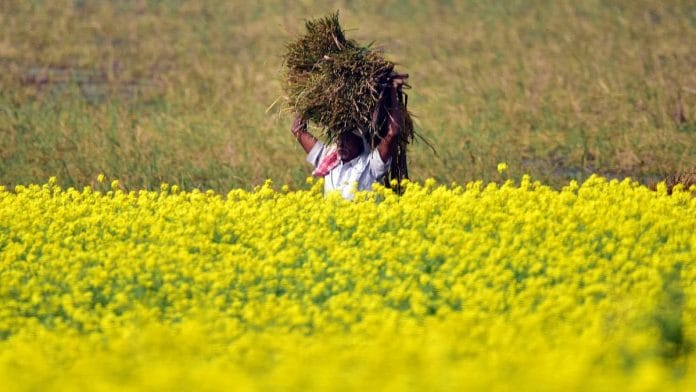New Delhi: The Genetic Engineering Appraisal Committee (GEAC), India’s biotech regulator, has recommended environmental release of genetically modified (GM) mustard, also called DMH-11, developed by the Delhi University.
If approved for commercial cultivation by the government, it will be the first GM food crop to be approved by India. In 2002, the government allowed cultivation of transgenic Bt cotton.
The decision comes on the backdrop of soaring edible oil prices in the past few years. India meets 70 per cent of its domestic cooking oil demand by importing a variety of oils, including palm, soybean and sunflower varieties.
DMH-11 was developed by Deepak Pental, a geneticist and former vice chancellor of Delhi University. The research was funded by the National Dairy Development Board, which markets different varieties of edible oils under the brand name ‘Dhara’.
“For GM mustard, it was a long wait, but better late than never…It’s a positive development,” Pental told ThePrint over phone. He added, “As per my understanding, GM mustard is now allowed for commercial cultivation. We will consider working with private companies for developing new hybrids.”
So far, India has not approved commercial cultivation of transgenic food crops but it continues to import large volumes of GM soybean oil from Argentina, Brazil and the United States. For instance, in 2021-22, India imported 4.1 million tonnes of GM soybean oil, about 70 per cent of its domestic consumption estimated at 5.8 million tonnes.
In 2020-21, India’s edible oil import bill surged to Rs 1,17,075 crore, from Rs 71,625 crore the year before.
‘Mustard yields in India abysmally low’
The decision by GEAC was taken during its 147th meeting held on 18 October. According to the minutes of the meeting that were published on 25 October, the regulator recommended “environmental release of mustard hybrid DMH-11 for its seed production and testing as per existing Indian Council of Agricultural Research guidelines and other extant rules/regulations prior to commercial release”.
“The technology of GM mustard will accelerate mustard breeding programme by both public and private sector resulting in introduction of high-yielding and superior mustard hybrids which are capable of revolutionising mustard farming and edible oil production in the country,” said Bhagirath Choudhary, founder director of Delhi-based South Asia Biotechnology Centre.
Choudhary added that mustard yields in India are abysmally low — around a tonne per hectare — and a third compared to countries like Canada, China and Australia, which grow canola and rapeseed.
According to the conditions set in GEAC’s recommendations, “usage of any formulation of herbicide is not permitted for cultivation in the farmer’s field under any situation and such use would require the necessary permission as per the procedures and protocols of safety assessment of insecticides.”
In 2017, GEAC had recommended commercial release of GM mustard, but the government had put it on hold following opposition from activist groups and the Swadeshi Jagran Manch, an affiliate of the Rashtriya Swayamsevak Sangh (RSS).
In 2010, then environment minister Jairam Ramesh had put an indefinite moratorium on transgenic brinjal after it was allowed for commercial release by the GEAC.
Also read: Why India banned export of broken rice & could more curbs be in the offing






